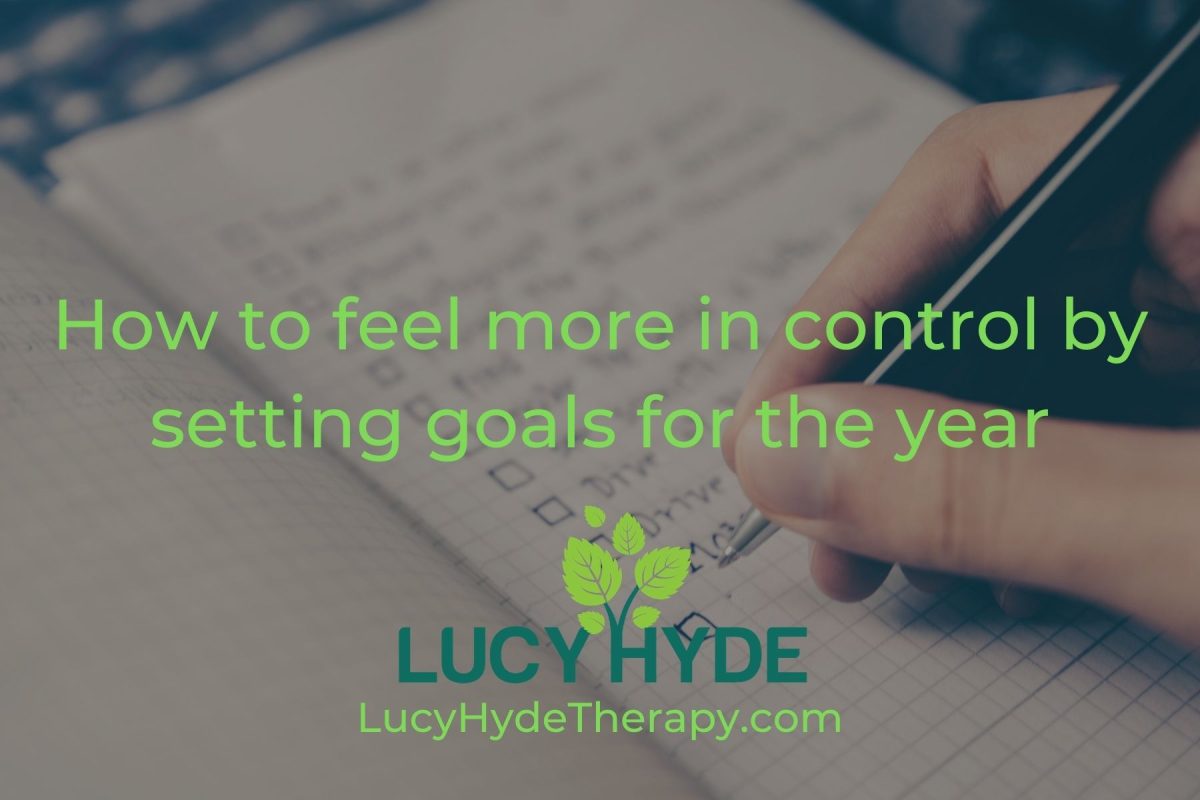How to feel more in control by setting goals for the year

“You never know ahead of time what something’s really going to be like.”
Katherine Paterson, ‘Bridge to Terabithia’
Please note that this article was written at the start of 2021 and references dates accordingly.
At the start of a new year, I always feel a sense of hope. The year is spread out in front of me like a beautiful expanse of pristine snow just waiting for me to make a path off into the distance. Or indeed, rush off, fall over and flail around getting wet. Even the start of 2021 had that sense of hope, although I didn’t buy in to the fantasy that 2021 was going to be wonderful, as if we could somehow close the door on what happened in 2020 when it was still happening.
I like to set goals at the start of the year. I don’t like New Year Resolutions (you can read more about this in my blog ‘Drop the Resolutions’). Even the word ‘goals’ smacks of business and sales targets, when what I’m talking about is a reflecting on what I want for myself – but ‘goals’ is the word that seems to fit best, so bear with me!
You may feel that with everything still so uncertain in the world, there’s no point in planning ahead. Perhaps you feel as if you’re just keeping your head above water in the latest phase of the pandemic battle. But goal-setting doesn’t have to be about major life changes or dream holiday plans.
Reflecting on what you want in the medium- or long-term can be a way to regain some control of your life, and can help provide a sense of purpose to support you when you’re finding things difficult, especially if you approach it in a way that is compassionate towards those parts of you that may be feeling anxious or worried.
So how to do it?

This is the process that works for me. I like to do it with paper and pen; you could do it on your laptop – but what’s important is to record your thoughts somehow so you can go back to them.
1. Review the previous year
2. Set your goals for the coming year
3. Check how you’ll know you’ve achieved your goals
4. Consider what might get in the way
5. Think how you’ll support yourself to get there
6. Review and refine your goals
7. Choose your Word of the Year
8. Keep your goals under review
Let’s talk about these in more detail.
1. Review the previous year
OK, so 2020 was a bit of shit-storm in many ways, and there are very few of us who didn’t find some of it difficult to a small or MASSIVE degree. This exercise needs to include acknowledging that, and appreciating that you got through it and survived.
But you can still take a bit of time to notice what went well for you, and/or what you achieved. For me, although my business increased and I feel very fortunate in that, what was more of an achievement, was noticing that I’d prioritised work over me. Revisiting what I needed in terms of my life balance led to me wild swimming regularly – in the process, discovering something new.
Over the last year, the circumstances we’ve been living in have meant that many more people have struggled with anxiety, with low mood or depression, or with feeling they have no control. If you feel you didn’t achieve anything, try to step outside yourself, look at what you were up against and how you’re still here. No achievement is too small to acknowledge.
If you did set goals last year, where are you in relation to them? What got in the way (hm, let me think, was it by any chance a pandemic?) and what can you learn from that? I didn’t achieve ANY of my goals from last year, other than my target client hours, and I’m fine with that, because I believe I focused my efforts to the best of my ability in the 2020 storm and ended the year healthy and mostly content.
2. Set your goals for the year
Do you have some kind of idea what you would like from your year? Probably. But it can still be helpful to think about it. If you’re self-employed, like me, then there’s a temptation to assume the goal is to increase income – but this may not always be entirely within your control, and anyway may not fit with what you actually want deep down.
Some people find it helpful to look at where they want to be in 5 years’ time, and then reflect on what this might mean for the coming year.
And this doesn’t have to be about professional goals. I always include at least one non-work goal, sometimes more, depending on what’s going on in my life. If the idea of setting goals doesn’t fit for you, you could try the ‘average perfect day’ exercise, where you spend time dreaming about what the average, routine day in your life would look like in an ideal world, in detail, so you can focus your attention on the gap between ‘here’ and ‘there’. You can read more about this exercise at ‘Average Perfect Day’ .
Spend some time daydreaming to help you set some goals – ideally 3 at the most, so be strict with yourself!
3. How will you know you’ve achieved your goals?
Thinking about this will help you refine your goals if they’re a bit ‘woolly’.
As an example, if I set a goal ‘to write more’, how am I going to know at the end of the year if I’ve written more than I did the year before? And what am I writing? On the other hand, if my goal is that I’ll have published a blog per month……….. if I get to the end of the year and I’ve published only 6 blogs since January, I’ll know I haven’t attained that goal (here’s a clue as to what one of my 2020 goals was ?).
Imagine you’re at the other end of the year looking back. Think about how the You in 12 months’ time is going to know whether you’ve got what you wanted. Getting a sense of this now will help you celebrate, but may also help you see where things have got in the way of your achieving what you wanted.
Are your goals concrete and clear enough?

4. What might get in the way?
It’s tempting to avoid thinking about this……… but ignoring it can be your downfall!
a. How might you sabotage yourself or allow others to sabotage you? It’s all very well to have ideals but it’s easy for old patterns of thinking to cut in and prevent us achieving them, with the result that we feel bad for not getting there and then get into self-blame for feeling bad.
Here’s an example. My main goal for 2021 is to complete my Focusing Practitioner Training, which I’m partway through. In order to be able to focus on my own training this year, I’ve decided to restrict my workload – but I know that this’ll create some anxiety for me around ‘not being a real therapist’; this anxiety has the potential to push me to take on more work, thereby sabotaging myself by not leaving enough time for the training course.
b. What will achieving your goals cost you? With any goal of doing something additional or different, there’s going to be something sacrificed – time, energy, money, etc. With the example above, achieving my training goal will cost me money this year, as my earnings are going to be lower. On the other had, what you sacrifice may be something you’re quite glad to let go – a toxic relationship, for example.
It’s important to take the cost into account, so that you can be more mindful that you have made a choice to prioritise one thing over another.
5. How can you support yourself?
The flip side of No. 4!
a. What will you gain in achieving your goals? This can be useful to consider, alongside the question of what achieving your goals will cost you. You may need to allow yourself to mourn for what you have to let go in order to achieve your goals, but you can balance that against what you’ll gain – why do you want this?
b. What do you need to do or NOT do to achieve your goals? Look at your responses to how you might sabotage yourself. So, with my example; I need to say No to additional clients over and above what I’ve decided is an OK level for me to maintain alongside my training. I also need to review my goals on a regular basis, so that if I’m struggling, I can decide what to prioritise, and what needs reassessing.
c. What resources do you need, and who might support you? This question will help you be realistic; you need to have the resources to get to where you want – whether it be financial, or emotional, or something else. For example, I need to remind myself that social supports are important for me – to ensure that I maintain contact with the people in my life who nourish me. If you can’t see where you can get the resources or support you need, you may need to get creative – perhaps by discussing this exercise with a friend or family member.
6. Review and refine your goals
Once you’ve completed steps 3 to 5, go back to the goals you set, and consider again whether they feel achievable. The purpose of those last few steps was to help you set goals that are realistic. If we continue to live through a series of lockdowns for the coming year, will this affect the achievability of your goals? Are they within your control? Are there less ambitious goals that are within your control and would move you toward where you ultimately want to be?
There’s a tendency to think that setting yourself high targets makes you work harder. Well, that might be the case for some people, but for most of us, we’re already pretty good at seeing where we feel we’ve failed; we don’t need to set ourselves up to do that.
Can you simplify or reduce your goals? Can you make it easier for yourself? Setting a goal or a target or a to-do list that some part of you believes is ‘too easy’ is more effective and more motivational than setting yourself one that you feel you ‘should’ be able to reach. Trust me on this, I’ve been there.
Now – adjust or rewrite your goals if necessary.

7. Choose a word for the year
You might already have something in mind, stimulated by this exercise. For example, the word that floated up for me was ‘Choice’ as it feels particularly relevant when I’ve chosen to commit to a goal that is going to affect how much work I can take on this year. Reminding myself that of ‘choice’ when I think ‘I have to’ is going to be useful.
If you don’t know where to begin, you could try simply writing down the first 20 words that come to mind and see if one fits, or do an internet search for ideas, such as 2021 Word of the Year . There’s no right or wrong with this.
Once you have your word, stick it up where you can see it from time to time.
8. Don’t leave your goals just lying there
Once you’ve done this exercise, come back to your goals in a week or so, to give yourself ‘settling time’. Read them over and see if there’s anything you want to add or change. Then, consider what smaller steps you can take to move forward. Break your goals down into the very smallest steps you can take.
Looking at the interim steps in this way might be particularly important if your ultimate goal is, for example, dependent on an end to pandemic restrictions. At some point, we will reach a less constrained ‘new normal’, and so there’s a good chance that there are smaller steps you can take to get yourself into a good position. Don’t forget to include attending to your own wellbeing as part of this process; your ultimate success requires you to be resilient and resourced.
Then pop a reminder somewhere to review your goals monthly or quarterly. Life gets in the way and for sure at the moment there may be lots of reasons why you feel you’re just plodding on. So make time for an occasional review of what you thought you wanted at the beginning of the year; this isn’t set in stone, so check – are your goals still relevant? What can you do to get closer to them?
And finally………..
Setting goals at the moment can feel as if it’s just another thing to make life hard. I’m tired of hearing about people who’ve seized the opportunity of lockdown to become expert on the piano, learn a foreign language from scratch or write a book. But this doesn’t have to be an opportunity to make yourself feel shitter; reflecting on what you want in your life can give structure and focus and bring your attention to what you can control rather than what you can’t. And by approaching it in a self-compassionate way, you might even help your dreams come true.
If you know what you want but aren’t sure how to get there (or if you don’t know what you want) you might find it helpful to speak to a therapist to clarify what you want for yourself and how you might make changes to help you move towards your goals. Get in touch with me via Contact details or search in a reputable online directory such as Counselling Directory , BACP or ACTO .

